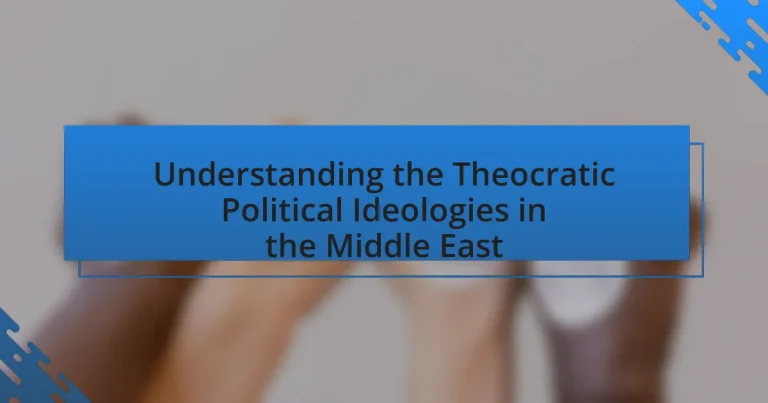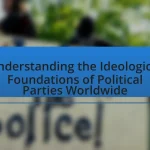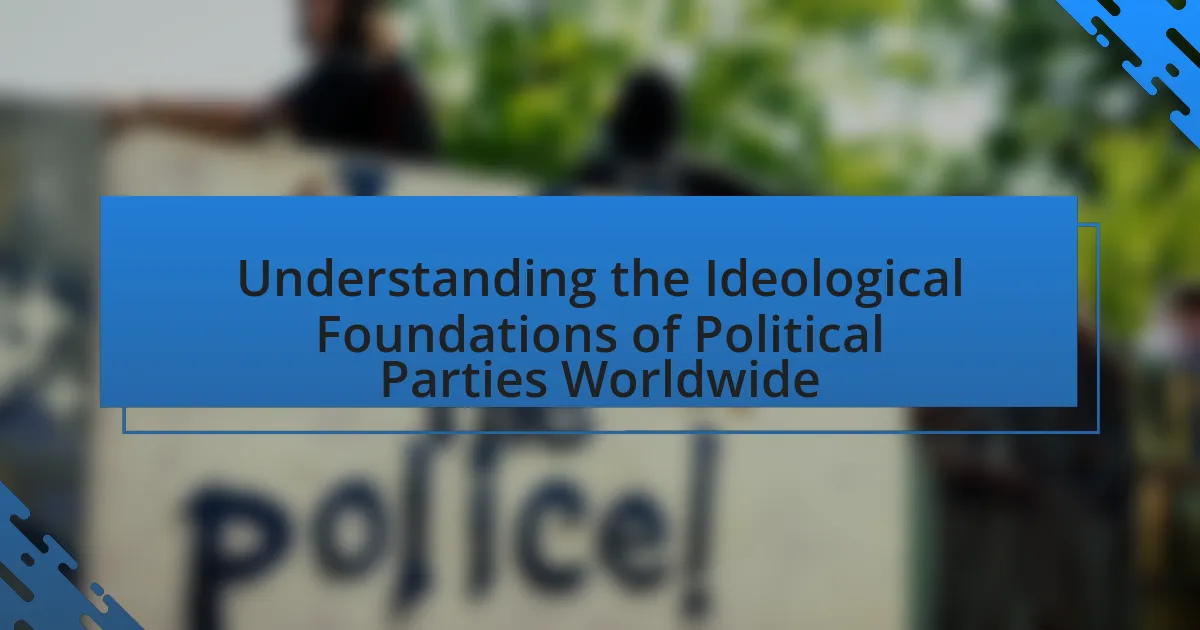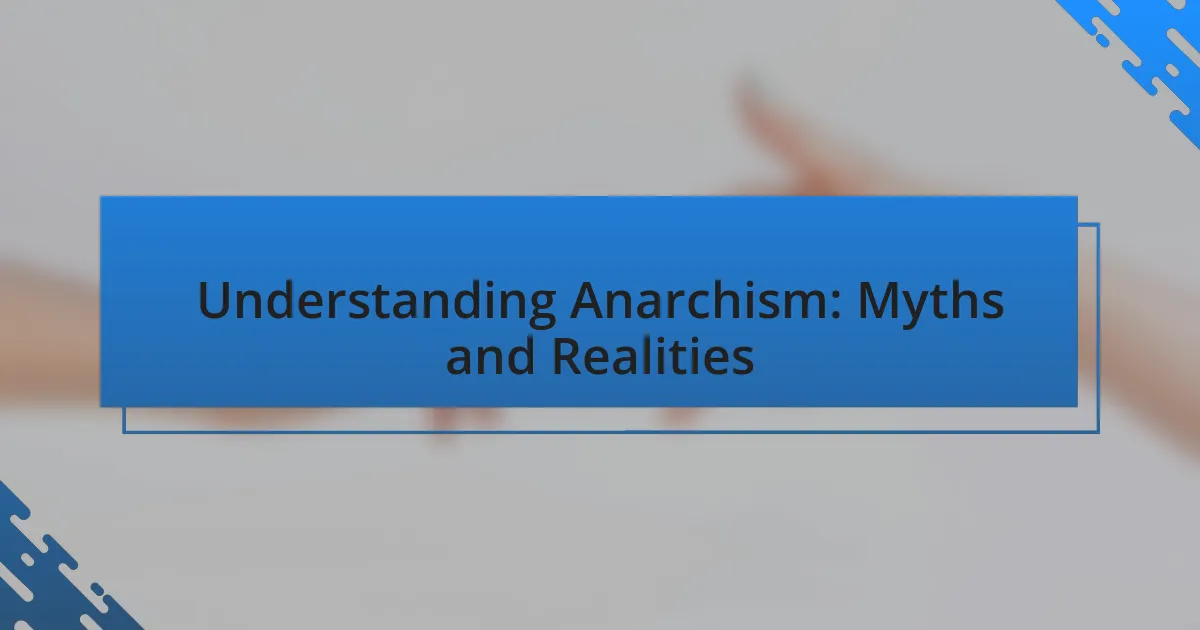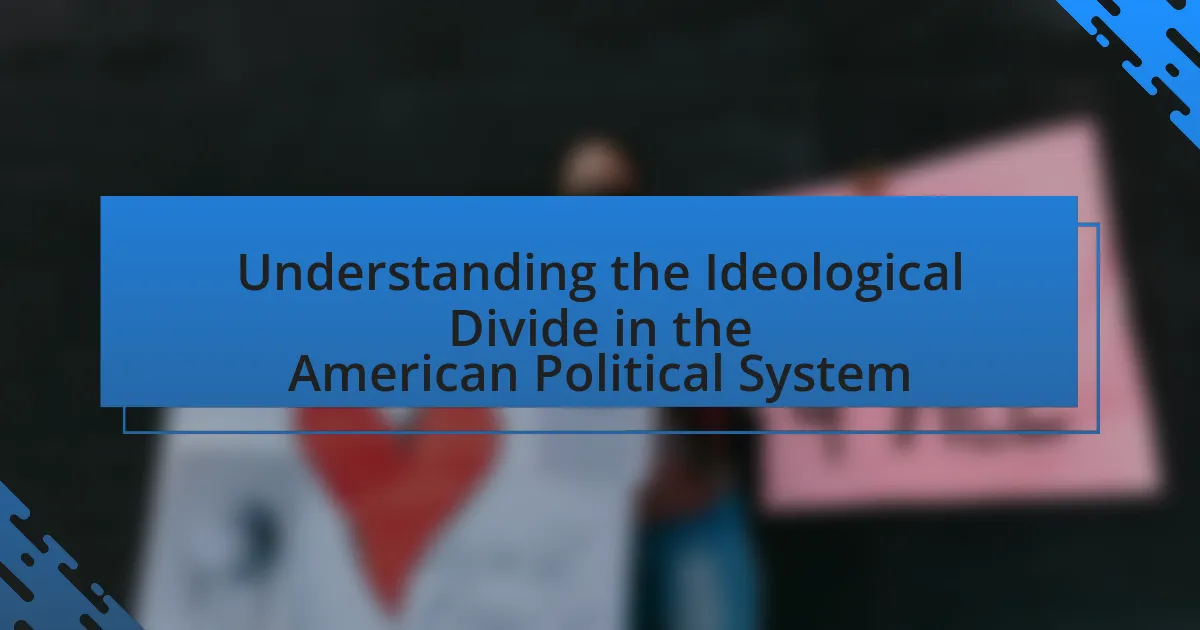The article focuses on the theocratic political ideologies prevalent in the Middle East, primarily examining how religious authority influences governance, law, and social norms in countries like Iran and Saudi Arabia. It contrasts these ideologies with secular political systems, highlighting the integration of religious law into state affairs and the implications for civil rights and international relations. Key characteristics of theocratic governance, historical developments, and the impact of religious beliefs on political dynamics are discussed, along with the challenges and prospects for reform within these systems. The article emphasizes the significance of understanding these ideologies for effective policy-making and international diplomacy in the region.
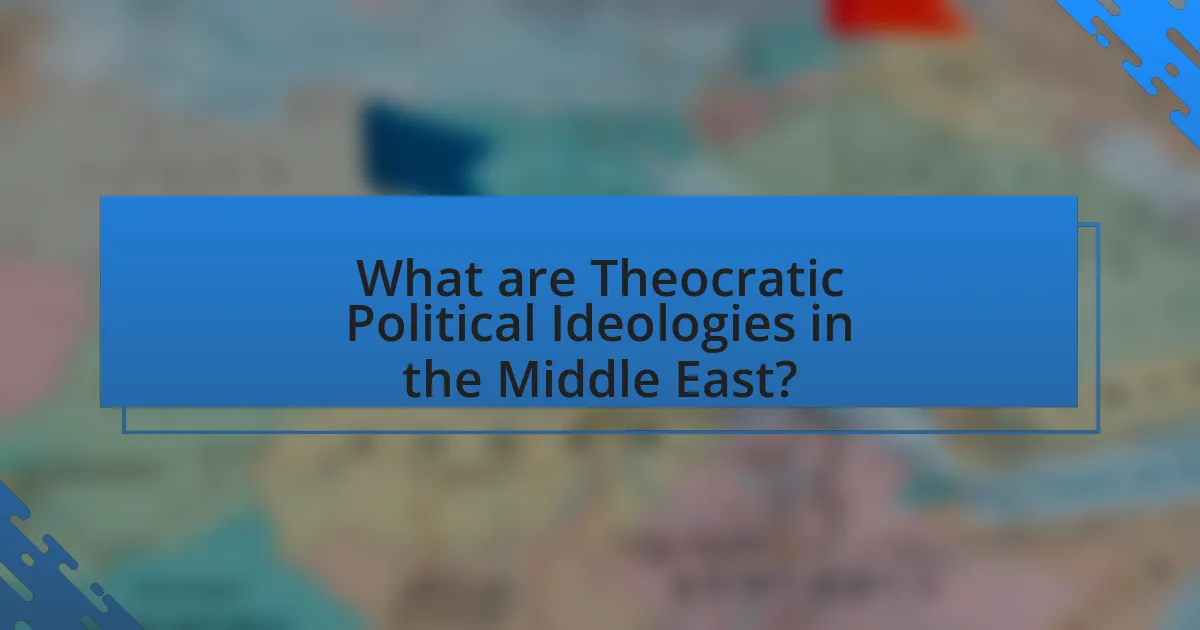
What are Theocratic Political Ideologies in the Middle East?
Theocratic political ideologies in the Middle East primarily include Islamic governance models, where religious leaders or institutions hold political power, and laws are derived from religious texts. Prominent examples are Iran’s Islamic Republic, which combines theocratic and democratic elements, and Saudi Arabia’s absolute monarchy, where governance is heavily influenced by Islamic law (Sharia). These ideologies shape laws, social norms, and political structures, reflecting the intertwining of religion and state authority in the region.
How do Theocratic Political Ideologies differ from Secular Political Systems?
Theocratic political ideologies differ from secular political systems primarily in their foundation on religious authority versus human governance. Theocratic systems, such as those in Iran, derive their legitimacy from religious texts and leaders, integrating religious law into governance, which dictates both political and social life. In contrast, secular political systems, like those in the United States or France, are based on principles of democracy and human rights, separating religion from state affairs and allowing for diverse beliefs and practices. This distinction is evident in the legal frameworks; for example, Iran’s legal system is heavily influenced by Sharia law, while secular states operate under civil law that prioritizes individual rights over religious mandates.
What are the key characteristics of Theocratic Political Ideologies?
The key characteristics of Theocratic Political Ideologies include the integration of religious authority into governance, where laws and policies are derived from religious texts and doctrines. In theocratic systems, political leaders often hold religious titles and derive their legitimacy from a divine source, as seen in countries like Iran, where the Supreme Leader is both a political and religious figure. Additionally, theocratic ideologies typically prioritize religious law over secular law, leading to the enforcement of moral codes based on religious beliefs, which can restrict individual freedoms and promote social conformity. Historical examples, such as the Vatican City, further illustrate how religious institutions can wield significant political power, influencing both domestic and international policies.
How do religious beliefs influence governance in Theocratic systems?
Religious beliefs fundamentally shape governance in theocratic systems by establishing the legal and moral framework that guides political authority. In these systems, religious leaders often hold significant power, and laws are derived from religious texts, which dictate both personal conduct and state policies. For example, in Iran, the Islamic Republic’s governance is heavily influenced by Shia Islamic principles, where the Supreme Leader, a religious figure, has authority over both spiritual and political matters, ensuring that governance aligns with Islamic law. This intertwining of religion and governance can lead to the implementation of laws that reflect religious doctrines, such as those governing family, criminal justice, and social behavior, thereby reinforcing the authority of religious institutions in the political sphere.
Why are Theocratic Political Ideologies significant in the Middle East?
Theocratic political ideologies are significant in the Middle East because they shape governance, influence social norms, and dictate legal frameworks based on religious principles. In countries like Iran, the political system is rooted in Shia Islam, where the Supreme Leader holds substantial power, demonstrating how religious authority directly impacts state functions. Additionally, the intertwining of religion and politics in nations such as Saudi Arabia, where Islamic law governs civil and criminal matters, illustrates the pervasive role of theocratic ideologies in everyday life. This significance is further evidenced by the ongoing conflicts and political movements in the region, which often arise from the struggle between secular and theocratic governance, highlighting the profound impact these ideologies have on regional stability and identity.
What historical events have shaped Theocratic Political Ideologies in the region?
The historical events that have shaped Theocratic Political Ideologies in the Middle East include the establishment of Islam as a state religion in the 7th century, the subsequent rise of caliphates, and the Iranian Revolution of 1979. The establishment of Islam as a state religion led to the integration of religious authority with political power, exemplified by the Rashidun and Umayyad caliphates, which set a precedent for governance based on Islamic law. The Iranian Revolution marked a significant shift, as it resulted in the establishment of a theocratic regime under Ayatollah Khomeini, which emphasized the role of religious leaders in political governance and inspired similar movements across the region. These events collectively reinforced the intertwining of religion and politics, shaping the theocratic ideologies prevalent in various Middle Eastern states today.
How do Theocratic Political Ideologies impact social and cultural dynamics?
Theocratic political ideologies significantly shape social and cultural dynamics by intertwining religious authority with governance, influencing laws, social norms, and cultural practices. In countries like Iran, the fusion of state and religion mandates that laws align with Islamic principles, affecting everything from family structures to gender roles. For instance, the enforcement of Sharia law in Iran restricts women’s rights, impacting their social status and cultural participation. Additionally, theocratic ideologies often promote a singular religious narrative, which can marginalize minority groups and suppress diverse cultural expressions, as seen in Saudi Arabia’s strict adherence to Wahhabism, limiting cultural practices that do not conform to its interpretation of Islam. These dynamics illustrate how theocratic governance can create a homogeneous cultural landscape, often at the expense of pluralism and individual freedoms.
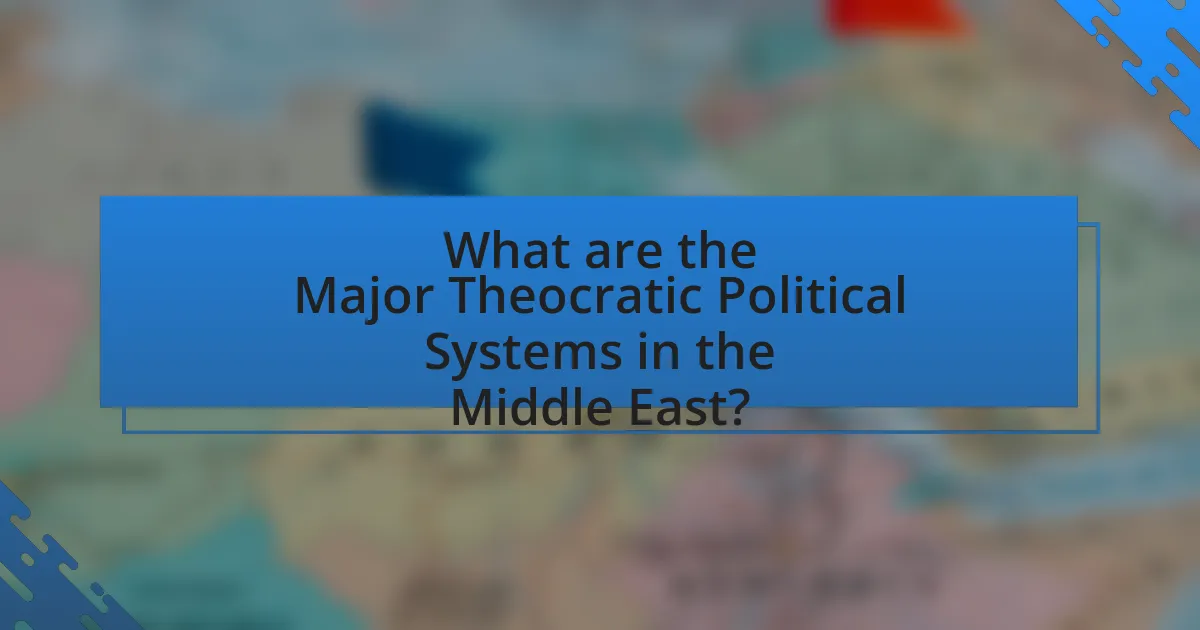
What are the Major Theocratic Political Systems in the Middle East?
The major theocratic political systems in the Middle East include Iran, Saudi Arabia, and the Vatican City, which, while not geographically in the Middle East, influences the region’s religious dynamics. Iran operates under a system known as the Islamic Republic, where the Supreme Leader holds significant power, blending religious authority with political governance, established after the 1979 revolution. Saudi Arabia is governed by a monarchy that enforces Islamic law (Sharia) as the basis for its legal system, with the king also serving as the Custodian of the Two Holy Mosques, reinforcing the intertwining of religion and state. These systems exemplify how religious doctrine shapes governance and law in the region, impacting both domestic and foreign policies.
Which countries in the Middle East practice Theocratic Political Ideologies?
Iran is the primary country in the Middle East that practices theocratic political ideologies. The Iranian government is based on the principles of Shia Islam, where the Supreme Leader holds significant authority over both political and religious matters. This theocratic system is enshrined in the 1979 Constitution, which establishes the framework for governance that intertwines religious leadership with state functions. Additionally, Saudi Arabia exhibits elements of theocratic governance, as its legal system is based on Islamic law (Sharia), and the monarchy derives its legitimacy from its role as the custodian of Islam’s two holiest sites.
What are the specific features of Theocracy in Iran?
The specific features of Theocracy in Iran include the central role of religious authority in governance, where the Supreme Leader holds significant power over state affairs, including military and judicial branches. This system is characterized by the intertwining of Islamic law (Sharia) with civil law, leading to the enforcement of religious principles in public life. Additionally, the Guardian Council, composed of clerics, oversees elections and legislation to ensure compliance with Islamic tenets. Theocratic governance in Iran also restricts political participation to those who align with the Islamic Republic’s ideology, limiting democratic processes. These features are rooted in the 1979 Iranian Revolution, which established the current theocratic regime, emphasizing the fusion of political and religious authority.
How does Saudi Arabia’s governance reflect Theocratic principles?
Saudi Arabia’s governance reflects theocratic principles primarily through its integration of Islamic law, or Sharia, into the legal and political framework. The country is governed by a monarchy that derives its legitimacy from Islamic authority, with the king also holding the title of “Custodian of the Two Holy Mosques,” emphasizing the religious significance of the monarchy. The legal system is based on Sharia, which governs all aspects of life, including criminal justice, family law, and personal conduct, reinforcing the intertwining of religion and state. Additionally, the Council of Senior Scholars, an influential body of clerics, advises the government on religious matters, ensuring that policies align with Islamic teachings. This structure exemplifies theocratic governance, where religious leaders and laws significantly influence political authority and societal norms.
What role does religion play in the political landscape of these countries?
Religion plays a central role in the political landscape of Middle Eastern countries, often influencing governance, law, and social norms. In countries like Iran, the political system is a theocracy where religious leaders hold significant power, and laws are based on Islamic principles, as seen in the enforcement of Sharia law. Similarly, in Saudi Arabia, the monarchy derives legitimacy from its role as the custodian of Islam’s two holiest sites, and its legal system is also rooted in Islamic law. This intertwining of religion and politics can lead to policies that reflect religious values, impacting everything from education to civil rights. The influence of religion in these nations is further evidenced by the significant role religious institutions play in shaping public opinion and political discourse, often mobilizing citizens around religious identity and issues.
How do religious leaders influence political decisions in Theocratic systems?
Religious leaders influence political decisions in theocratic systems by serving as both spiritual authorities and political advisors, often shaping laws and governance based on religious doctrine. In countries like Iran, the Supreme Leader, a religious figure, holds significant power over state affairs, guiding policies that align with Islamic principles. This intertwining of religion and politics is evident in the enforcement of Sharia law, which dictates legal frameworks and societal norms. Historical examples include the 1979 Iranian Revolution, where religious leaders mobilized public support to establish a theocratic regime, demonstrating their capacity to direct political change through religious authority.
What are the implications of religious law on civil rights in Theocratic states?
Religious law in Theocratic states significantly restricts civil rights, as it often prioritizes religious doctrine over individual freedoms. In such systems, laws derived from religious texts can limit rights related to gender equality, freedom of expression, and religious pluralism. For instance, in Iran, the legal system is based on Sharia law, which imposes strict regulations on women’s rights, including dress codes and limitations on legal testimony. This results in systemic discrimination against women and non-Muslims, undermining their civil liberties. Furthermore, the enforcement of religious law can lead to severe penalties for those who dissent or violate religious norms, as seen in countries like Saudi Arabia, where apostasy and blasphemy can result in capital punishment. Thus, the implications of religious law in Theocratic states manifest in a legal framework that often curtails fundamental human rights and freedoms.
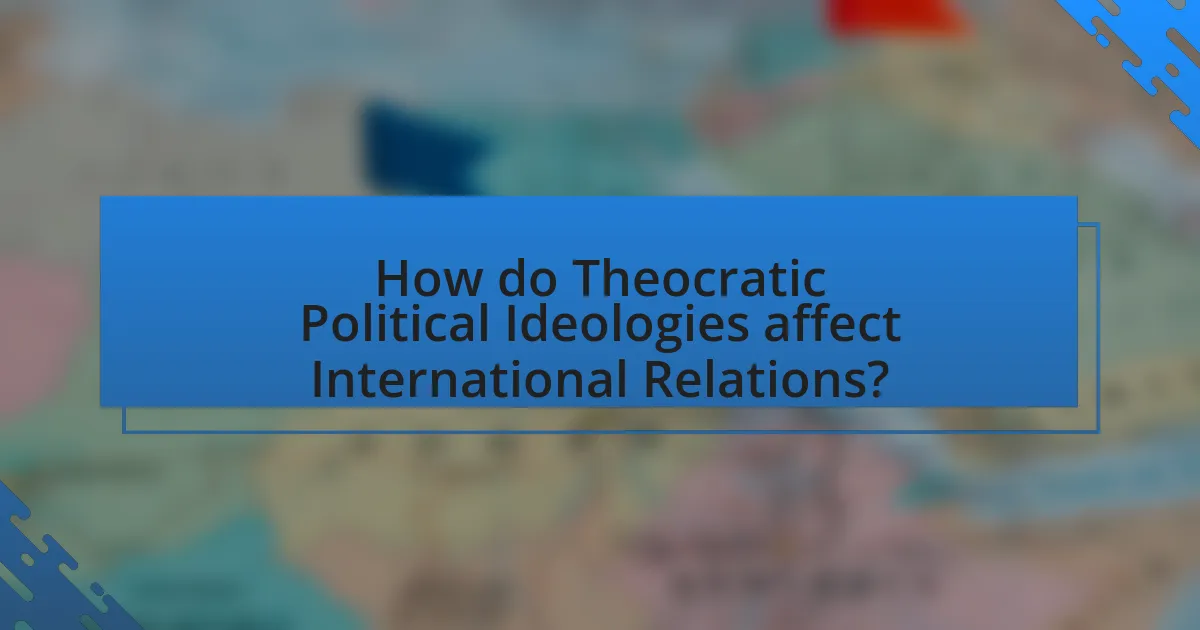
How do Theocratic Political Ideologies affect International Relations?
Theocratic political ideologies significantly influence international relations by shaping state behavior, foreign policy, and diplomatic interactions. For instance, countries like Iran, which operates under a theocratic regime, often prioritize religious doctrine in their international engagements, leading to tensions with secular states and differing ideological blocs. The Iranian Revolution of 1979 exemplifies this, as it transformed Iran’s foreign policy to focus on exporting its Islamic revolution, impacting relations with Western nations and neighboring countries. Additionally, theocratic ideologies can lead to alliances based on shared religious beliefs, as seen in the relationships between Iran and Hezbollah, which further complicates regional dynamics and international diplomacy.
What challenges do Theocratic Political Ideologies pose for diplomacy in the Middle East?
Theocratic political ideologies in the Middle East create significant challenges for diplomacy by prioritizing religious doctrine over secular governance, which complicates negotiations and alliances. For instance, countries like Iran, governed by a theocratic regime, often pursue policies that align with their religious beliefs, leading to tensions with nations that advocate for secular governance or different religious interpretations. This ideological divide can result in a lack of mutual understanding and trust, making diplomatic efforts more difficult. Additionally, the influence of religious leaders in political decision-making can hinder compromise, as seen in the case of Hezbollah in Lebanon, where religious motivations drive political actions that conflict with international diplomatic norms.
How do Theocratic regimes interact with secular governments?
Theocratic regimes interact with secular governments primarily through a complex relationship characterized by both cooperation and conflict. For instance, in countries like Iran, the theocratic leadership often seeks to influence secular policies to align with religious laws, while secular governments may resist such encroachments to maintain their authority and secular identity. This dynamic can lead to tensions, as seen in the case of Turkey, where the government has oscillated between secularism and Islamic governance, impacting its relations with both domestic and international secular entities. Additionally, the interaction is often shaped by geopolitical factors, such as alliances and conflicts, which can either exacerbate or mitigate tensions between theocratic and secular governance.
What role does ideology play in conflicts involving Theocratic states?
Ideology plays a central role in conflicts involving theocratic states by shaping their governance, policies, and interactions with other nations. Theocratic states, such as Iran, base their political systems on religious doctrines, which often leads to a clash with secular ideologies and differing religious beliefs. For instance, Iran’s Islamic Revolution in 1979 established a government that prioritizes Shia Islamic law, influencing its foreign policy and contributing to tensions with Sunni-majority countries and Western nations. This ideological framework can justify aggressive actions, such as military interventions or support for proxy groups, as seen in Iran’s involvement in Syria and Lebanon. The ideological commitment to spreading a particular interpretation of Islam often exacerbates regional conflicts, as it fosters a sense of religious duty among followers to engage in jihad or resist perceived threats to their faith.
What are the potential future trends for Theocratic Political Ideologies in the Middle East?
The potential future trends for theocratic political ideologies in the Middle East include increased political influence of religious leaders, the rise of populist religious movements, and a potential shift towards more moderate interpretations of religious governance. As seen in countries like Iran and Saudi Arabia, religious authorities are likely to continue shaping national policies, particularly in areas such as law, education, and social norms. Additionally, the Arab Spring highlighted the power of grassroots religious movements, suggesting that populism may drive the resurgence of theocratic ideologies. Furthermore, the ongoing dialogue within Islamic communities about modernity and governance could lead to more moderate interpretations, as evidenced by movements advocating for reform in countries like Tunisia. These trends indicate a complex interplay between tradition and modernity in the political landscape of the Middle East.
How might globalization influence Theocratic Political Ideologies?
Globalization may influence theocratic political ideologies by introducing diverse cultural, economic, and political ideas that challenge traditional religious governance. As global interconnectedness increases, the exposure to secular values and democratic principles can lead to a reevaluation of theocratic norms. For instance, the rise of social media and communication technologies allows for the dissemination of alternative viewpoints, which can undermine the authority of religious leaders and institutions. Additionally, economic globalization can create pressures for reform, as countries with theocratic systems may seek foreign investment and trade partnerships that require adherence to more secular governance practices. This dynamic has been observed in various Middle Eastern countries, where the influence of global economic trends has prompted some theocratic regimes to adopt more pragmatic policies to maintain stability and legitimacy.
What are the prospects for reform within Theocratic systems?
The prospects for reform within theocratic systems are generally limited due to the intertwining of religious authority with political power. In many theocratic regimes, such as Iran, the ruling clerics maintain strict control over governance, making significant reforms challenging. Historical evidence shows that attempts at reform, like the Green Movement in Iran in 2009, faced severe repression, indicating the resistance to change within such systems. Additionally, the lack of secular political structures often inhibits the emergence of reformist movements, as seen in various Middle Eastern countries where religious institutions dominate political discourse.
What can be learned from the study of Theocratic Political Ideologies in the Middle East?
The study of Theocratic Political Ideologies in the Middle East reveals the significant influence of religious beliefs on governance and political structures. These ideologies often intertwine religious authority with state power, as seen in countries like Iran, where the political system is based on Islamic law, or Sharia. This integration shapes laws, social norms, and public policy, demonstrating how religious doctrine can dictate political behavior and societal expectations. Historical examples, such as the establishment of the Islamic Republic of Iran in 1979, illustrate the profound impact of theocratic governance on national identity and international relations, highlighting the complexities and challenges posed by blending religion with politics in the region.
How can understanding these ideologies inform policy-making and international relations?
Understanding theocratic political ideologies in the Middle East can significantly inform policy-making and international relations by providing insights into the motivations and behaviors of state and non-state actors in the region. For instance, recognizing how religious beliefs shape governance and societal norms can help policymakers anticipate responses to diplomatic initiatives, as seen in Iran’s adherence to Islamic principles that influence its foreign policy decisions. Additionally, understanding these ideologies allows for more effective engagement strategies, as evidenced by the varying degrees of acceptance of Western influence in countries like Saudi Arabia compared to more ideologically rigid states. This comprehension can lead to tailored approaches that respect cultural contexts, ultimately fostering more stable international relations.
What best practices can be derived from the governance of Theocratic states?
Best practices derived from the governance of Theocratic states include the integration of religious principles into legal frameworks, which fosters social cohesion and moral guidance. For instance, Iran’s legal system is heavily influenced by Islamic law, promoting a sense of unity among its citizens. Additionally, Theocratic governance often emphasizes community involvement in decision-making processes, as seen in the role of religious leaders in local governance in countries like Saudi Arabia. This approach can enhance public trust and engagement in governance. Furthermore, the prioritization of education based on religious values, as practiced in various Theocratic states, can lead to a more informed citizenry aligned with national ideologies. These practices demonstrate how Theocratic governance can create a structured society that aligns with specific cultural and religious values.
